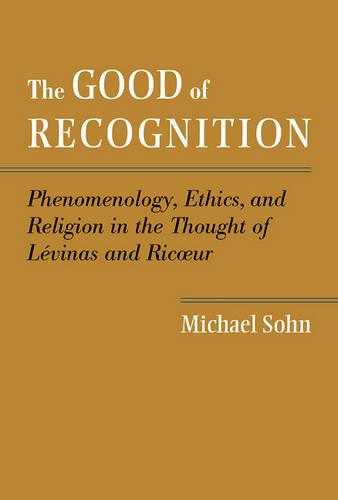Overview
The Good of Recognition analyzes the polysemy of recognition operative in the thought of two contemporary French thinkers, Emmanuel Lévinas (1906–1995) and Paul Ricœur (1913–2005). Author Michael Sohn shows that recognition—a concept most often associated with Hegel’s works—appears prominently throughout the works of Lévinas and Ricœur, which exist at the intersection of phenomenology, ethics, politics, and religion. Sohn situates recognition in the sociopolitical context of Lévinas and Ricœur and excavates the philosophical and religious sources that undergird the two thinkers’ use of recognition before contextualizing recognition within the broader themes of their thought. By reflecting on phenomenology, ethics, and religion in The Good of Recognition, Sohn not only shows how Lévinas and Ricœur articulated a response to the pervasive problems of nonrecognition and misrecognition in their day but also suggests how their thought can contribute to a better understanding of our contemporary social and political landscape.
Full Product Details
Author: Michael Sohn
Publisher: Baylor University Press
Imprint: Baylor University Press
Dimensions:
Width: 15.20cm
, Height: 2.50cm
, Length: 22.90cm
Weight: 0.448kg
ISBN: 9781481300629
ISBN 10: 1481300628
Pages: 172
Publication Date: 01 December 2014
Audience:
College/higher education
,
Professional and scholarly
,
Postgraduate, Research & Scholarly
,
Professional & Vocational
Format: Hardback
Publisher's Status: Active
Availability: Temporarily unavailable

The supplier advises that this item is temporarily unavailable. It will be ordered for you and placed on backorder. Once it does come back in stock, we will ship it out to you.
Reviews
In this new and exciting book, Michael Sohn offers a fresh perspective on the concept of recognition by interfacing the ethical project of Emmanuel Levinas with the work of Paul Ricoeur. By interfacing these two figures in particular, Sohn also helps us see the similarities and differences in thinking through Christian and Jewish ethics, an important relation for both thinkers but certainly for readers of Emmanuel Levinas. His book is a significant contribution to the secondary literature not only on Levinas and Ricoeur, but also to those working thematically on recognition--including Hegel scholars, scholars working on psychoanalysis, and feminist theorist. -- Claire Katz, Professor of Philosophy & Women's & Gender Studies, Texas A&M University Michael Sohn makes a significant contribution to the contemporary debates in philosophy of religion and political philosophy while pushing them in important new directions, impressively offering an account of recognition that is both theologically sophisticated and also historically aware. This book demonstrates that sophisticated work in continental philosophy can still be clear, lucid, and convincing. -- J Aaron Simmons, Assistant Professor of Philosphy, Furman University
Michael Sohn makes a significant contribution to the contemporary debates in philosophy of religion and political philosophy while pushing them in important new directions, impressively offering an account of recognition that is both theologically sophisticated and also historically aware. -- J Aaron Simmons, Furman University In this new and exciting book, Michael Sohn offers a fresh perspective on the concept of recognition by interfacing the ethical project of Emmanuel Levinas with the work of Paul Ricoeur. By interfacing these two figures in particular, Sohn also helps us see the similarities and differences in thinking through Christian and Jewish ethics, an important relation for both thinkers but certainly for readers of Emmanuel Levinas. His book is a significant contribution to the secondary literature not only on Levinas and Ricoeur, but also to those working thematically on recognition--including Hegel scholars, scholars working on psychoanalysis, and feminist theorist. --Claire Katz, Professor of Philosophy and Women's and Gender Studies, Texas A&M University
In this new and exciting book, Michael Sohn offers a fresh perspective on the concept of recognition by interfacing the ethical project of Emmanuel Levinas with the work of Paul Ricoeur. By interfacing these two figures in particular, Sohn also helps us see the similarities and differences in thinking through Christian and Jewish ethics, an important relation for both thinkers but certainly for readers of Emmanuel Levinas. His book is a significant contribution to the secondary literature not only on Levinas and Ricoeur, but also to those working thematically on recognition--including Hegel scholars, scholars working on psychoanalysis, and feminist theorist. -- Claire Katz, Professor of Philosophy & Women's & Gender Studies, Texas A&M University Michael Sohn makes a significant contribution to the contemporary debates in philosophy of religion and political philosophy while pushing them in important new directions, impressively offering an account of recognition that is both theologically sophisticated and also historically aware. This book demonstrates that sophisticated work in continental philosophy can still be clear, lucid, and convincing. -- J Aaron Simmons, Assistant Professor of Philosphy, Furman University An erudite and impressive work of seminal scholarship, The Good of Recognition: Phenomenology, Ethics, and Religion in the Thought of Levinas and Ricoeur will prove to be an enduringly valued addition to academic library Philosophy Studies collections in general, and a critically important addition to the supplemental studies reading lists for students of the lives and works of Emmanuel Levinas and Paul Ricoeur in particular. -- John Burroughs -- Midwest Book Review The Good of Recognition provides an excellent introduction for any reader who is approaching Levinas or Ricoeur for the first time as well as for those who are already familiar with their work but seek to understand it more deeply. -- Scott Davidson, Oklahoma City University -- Philosophy in Review
Michael Sohn makes a significant contribution to the contemporary debates in philosophy of religion and political philosophy while pushing them in important new directions, impressively offering an account of recognition that is both theologically sophisticated and also historically aware. --J. Aaron Simmons, Furman University
Author Information
Michael Sohn is Visiting Assistant Professor in the Department of Philosophy and Comparative Religion at Cleveland State University.




